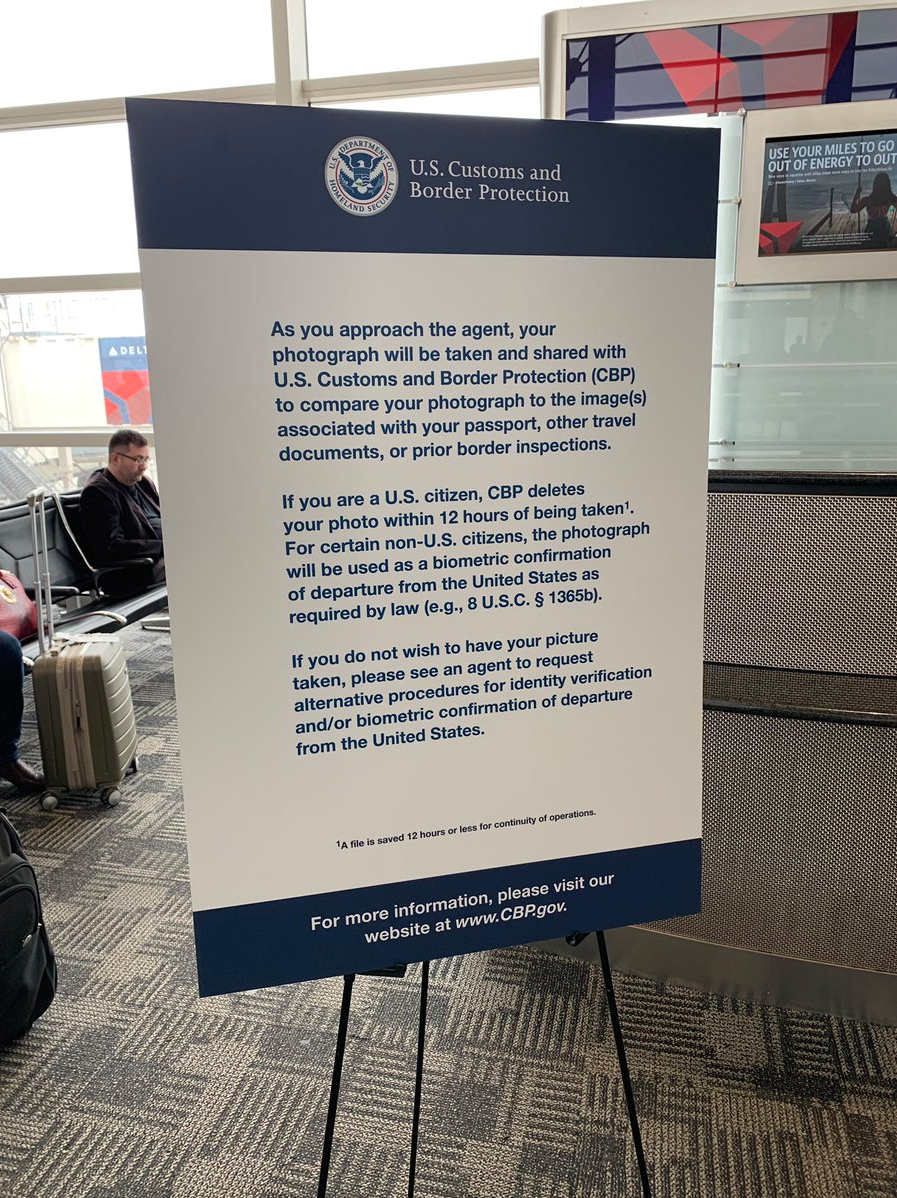If you read about travel a lot, you’ve most likely heard that in recent months, the U.S. Customs and Border Protection’s (CBP) has been rolling out facial recognition technology at various airports. In fact, if you travel a lot, you may have already experienced it.
After an 18 month long “rolling out” period, facial recognition technology was officially implemented at its first airport, JFK, in November 2018. It’s now in use for international departures at multiple large airports such as those in Miami, San Jose, Atlanta, Boston, Chicago and Orlando, and the goal is for the technology to be in place to scan 97 percent of all outbound international travelers by 2021, despite questions about its legalities and bias.
How it works: Before you board your plane, the airport or airline you’re flying with takes a picture of your face at the gate, and sends the encrypted image to the U.S. Customs and Border Protection’s (CBP) Traveler Verification Service system, which runs on a cloud server. CBP’s face-matching algorithm confirms that the person in the image is the same one that’s in your passport photo by creating a biometric template based on your photograph. The template is a set of measurements of the size and shape of features, such as your eyes, and the distance between your features, like your nose and upper lip (similar technology, using your fingerprint, is used at Walt Disney World). The system then compares that template to a preloaded gallery of passenger photos that are pulled from government-issued photos such as passports, visas and driver’s licenses.
You can opt out at this time, if you’d like, and they’ll use alternative procedures for identity verification.

Source: Twitter/Juli Lyskawa
Unfortunately, the system had only had a 75% to 85% success rate in the earlier months of implementation in November 2018. Using similar facial recognition technology, private researchers have discovered that most mistakes have happened with those who have darker skin, and especially with dark-skinned women (up to 35% percent error rate), which has garnered ACLU opposition to the process. Although a spokesperson for CBP says that their successful match rate is now actually 98.6%, they have not shown proof of this.
Which brings up another issue – there are several questions regarding the legality and oversight of a U.S. government agency using facial recognition technology. In fact, according to Buzzfeed, the United States Department of Homeland Security is rushing to get systems up and running at airports across the country without proper vetting and regulatory safeguards. That includes the facts that there’s no transparency in the system, and no limits have been set regarding how airlines and airports can use this facial recognition data. Plus, the program might be going beyond the authority granted to the Department of Homeland Security (CBP falls under its umbrella) by Congress because Congress has never explicitly authorized biometric collections from Americans at the border (the government is authorized to get biometric information from visitors, but not its citizens).
And how does the public feel about this? Well, it seems to depend on the person. Some people have no issues with it. Other people seem to have very strong opinions on the matter.
I just boarded an international @JetBlue flight. Instead of scanning my boarding pass or handing over my passport, I looked into a camera before being allowed down the jet bridge. Did facial recognition replace boarding passes, unbeknownst to me? Did I consent to this?
— MacKenzie Fegan (@mackenzief) April 17, 2019
If you have Facebook, an iPhone, a driver’s license, 23&me, etc your image and personal information is already stored and passed around the internet and numerous government agencies no matter what they tell you on the surface. No one is off the grid at this point. 🤷🏾♂️
— Oliver IV (@Oseaivy) April 20, 2019
https://twitter.com/VJS_Policy/status/1119340522647228416
Imagine that governmental organisations around the world with zero expertise in #CyberSecurity and proven inability to secure even their own #data, handling your most #Personal #INFORMATION and sharing them "securely" with third parties!#DataSecurity #dataprivacy #fail
— Geek Culture & Tech (@GC_and_Tech) April 21, 2019
A thread of old people not realizing its 2019 and that technology will continue to be implemented into all areas of life.
— Cody Palubicki 🇺🇸 (@theBigBicki) April 20, 2019
Example – look at how data on so called social credit is used to prevent some people in China flying at all https://t.co/j790hvOMEf
— Dirk Singer (@dirktherabbit) April 20, 2019
https://twitter.com/WolfpackCrypto/status/1120007017668718593
What do you think about the U.S. Customs and Border Protection using facial recognition for international flights at this time?
Like this post? Please share it! We have plenty more just like it and would love if you decided to hang around and clicked the button on the top (if you’re on your computer) or the bottom (if you’re on your phone/tablet) of this page to follow our blog and get emailed notifications of when we post (it’s usually just two or three times a day). Or maybe you’d like to join our Facebook group, where we talk and ask questions about travel (including Disney parks), creative ways to earn frequent flyer miles and hotel points, how to save money on or for your trips, get access to travel articles you may not see otherwise, etc. Whether you’ve read our posts before or this is the first time you’re stopping by, we’re really glad you’re here and hope you come back to visit again!
This post first appeared on Your Mileage May Vary
